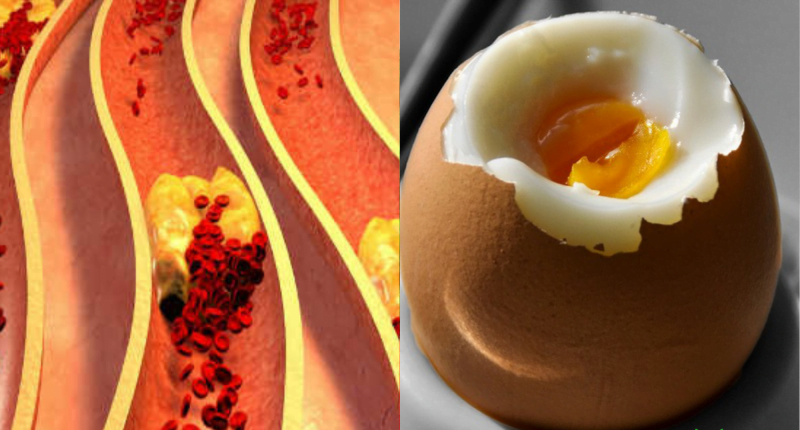Are Eggs Bad for High Cholesterol? Before we dive into the topic of eggs and cholesterol, it’s important to understand what cholesterol is. Cholesterol is a waxy substance found in our blood, and it plays an essential role in our bodies. It’s used to make hormones, vitamin D, and bile acids that help us digest food. However, when we have too much cholesterol in our blood, it can build up in our arteries and increase the risk of heart disease.
Are Eggs Bad for High Cholesterol People?
The relationship between egg consumption and cholesterol levels is somewhat controversial. While eggs are a good source of protein and other nutrients, including cholesterol, some studies have suggested that consuming too many eggs may contribute to high cholesterol levels in some people.
Cholesterol is a fatty substance that is produced by the liver and also found in many foods, including eggs. When we consume cholesterol in our diet, it is absorbed into our bloodstream and can contribute to the build-up of fatty deposits in our arteries, which can increase the risk of heart disease and stroke.
However, it is important to note that not all cholesterol is created equal. There are two types of cholesterol: LDL (low-density lipoprotein) and HDL (high-density lipoprotein). LDL is often referred to as “bad” cholesterol because it can contribute to the build-up of fatty deposits in our arteries, while HDL is often referred to as “good” cholesterol because it helps to remove LDL from the bloodstream.
Some studies have suggested that consuming eggs may increase LDL cholesterol levels in some people, while others have found no significant effect. However, most studies agree that consuming eggs in moderation (up to one egg per day) is unlikely to have a significant impact on cholesterol levels in healthy individuals.
If you have high cholesterol or are at risk of heart disease, it is important to talk to your doctor or a registered dietitian about your diet and how it may impact your cholesterol levels. They can help you create a personalized plan that includes a balanced intake of nutrients, including protein, and may suggest limiting your consumption of foods high in cholesterol.
More On The Relationship between Eggs and Cholesterol
For many years, eggs were believed to be a significant contributor to high cholesterol levels. This is because egg yolks are high in cholesterol, containing about 186 milligrams of cholesterol per large egg. However, research in recent years has shown that the link between dietary cholesterol and blood cholesterol levels is not as straightforward as once thought.
Studies have shown that for most people, consuming dietary cholesterol has a minimal effect on blood cholesterol levels. In fact, the majority of people are able to eat up to one egg per day without it affecting their cholesterol levels. However, for some people who are more sensitive to dietary cholesterol, consuming too many eggs or other cholesterol-rich foods may cause an increase in their blood cholesterol levels.
The Benefits of Eggs
Despite their reputation as a high-cholesterol food, eggs are a versatile and nutritious food that can offer a variety of benefits to the human body. Here are some awesome benefits of eggs:
-
Rich in nutrients: Eggs are an excellent source of high-quality protein, essential vitamins, and minerals such as vitamin A, vitamin D, vitamin B12, and iron.
-
Good for the eyes: Eggs are rich in lutein and zeaxanthin, two antioxidants that can help prevent macular degeneration, a common cause of age-related blindness.
-
Brain health: Eggs are high in choline, a nutrient that is important for brain development and function.
-
Weight management: Eggs can help with weight management as they are a high-protein, low-calorie food that can help you feel fuller for longer.
-
Heart health: Contrary to previous beliefs, eggs have been shown to have little effect on blood cholesterol levels and may actually improve heart health by increasing levels of good cholesterol.
-
Muscle growth and repair: Eggs contain all the essential amino acids needed for muscle growth and repair, making them excellent food for athletes and people who exercise regularly.
-
Bone health: Eggs are a good source of vitamin D, which is essential for strong bones and teeth.
-
Healthy skin and hair: The high protein content in eggs can help improve the health and appearance of skin and hair.
-
Boosts immunity: Eggs are rich in nutrients like selenium and zinc, which can help boost the immune system.
-
Convenient and easy to prepare: Eggs are easy to prepare in a variety of ways and can be incorporated into meals throughout the day, making them a convenient and versatile food choice.
Who Should Limit Their Egg Consumption?
While eggs can be a healthy part of most people’s diets, there are some individuals who may need to limit their egg consumption. People who have been diagnosed with high cholesterol, particularly those with high levels of LDL cholesterol (often called “bad” cholesterol), should limit their intake of cholesterol-rich foods, including eggs.
In addition, people who have diabetes or a family history of heart disease may also need to limit their egg intake, as these individuals are at an increased risk of developing heart disease.
How to Enjoy Eggs in a Healthy Way
While eggs can be a healthy addition to most people’s diets, there are certain individuals who may need to limit their egg consumption. This includes individuals who have high cholesterol levels or a family history of heart disease. It’s important for these individuals to talk to their doctor or a registered dietitian to determine the appropriate amount of eggs to consume based on their individual health needs.
In general, most healthy adults can safely consume up to one egg per day without it negatively affecting their health. However, it’s important to remember that eggs are just one part of a healthy diet, and consuming a variety of nutrient-dense foods is key for optimal health and wellbeing.
For individuals who need to limit their egg consumption, there are many other healthy protein sources available, such as lean meats, fish, tofu, and legumes. By incorporating a variety of these foods into their diet, individuals can still meet their protein needs without consuming excessive amounts of dietary cholesterol.
Conclusion
So, are eggs bad for high cholesterol? The answer is that it depends on the individual. For most people, eating eggs in moderation is a healthy part of a balanced diet. However, for some individuals, particularly those with high cholesterol, limiting their egg consumption may be necessary.
Regardless of your cholesterol levels, it’s important to remember that eggs offer many health benefits and are a nutritious addition to your diet. When consumed in moderation and prepared in a healthy way, eggs can be part of a balanced diet that supports overall health and wellbeing.
FAQs
A: For most people, consuming dietary cholesterol has a minimal effect on blood cholesterol levels. However, some individuals who are more sensitive to dietary cholesterol may see an increase in their blood cholesterol levels if they consume too many eggs or other cholesterol-rich foods.
A: Most people can safely consume up to one egg per day without it affecting their cholesterol levels. However, it’s important to talk to your doctor or a registered dietitian to determine the amount of eggs that is appropriate for you based on your individual health needs.
A: Egg whites are lower in calories and cholesterol than whole eggs, making them a healthier option for some individuals. However, whole eggs contain important nutrients, such as vitamin D and choline, that are not found in egg whites.
A: Boiling, poaching, or scrambling eggs with minimal added fat is a healthy way to enjoy eggs. Frying eggs in butter or oil can increase their fat and calorie content, which can contribute to weight gain and other health issues.
A: In addition to limiting your intake of cholesterol-rich foods, such as eggs, you should also limit your intake of saturated and trans fats, which can increase your cholesterol levels. Foods high in saturated and trans fats include fatty meats, full-fat dairy products, and processed foods. Instead, focus on consuming a diet rich in fruits, vegetables, whole grains, and lean protein sources.
Copyright © 2022 Soundhealthandlastingwealth.






